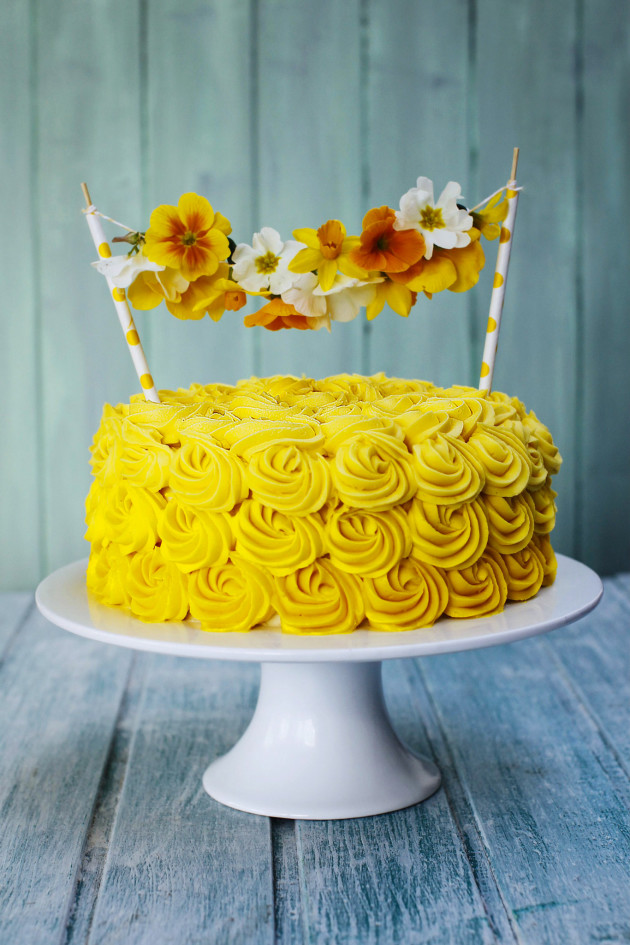
Recipe: This lemon and poppy seed rose cake is too delicious
Sharon Hearne Smith shared her go-to Easter recipe for this delicious cake. This stunning rose effect is surprisingly easy to achieve once you have a piping bag fitted with a star nozzle. Be sure to practice your rose making technique on a plate first but if you do make a mistake on the cake, simply lift the rose off and go again. While the recipe makes a large amount of buttercream, it is necessary to achieve this effect. It is important to use a gel and not liquid food colour to avoid watering down the buttercream. The buttercream can be prepared up to 24 hours in advance and left in the fridge, but it will harden, so remove it about 15 minutes before you need it to let it soften up.

Serves 8-10
Cake
250g unsalted butter, plus extra for greasing
250g caster sugar
4 large eggs
250g self-raising flour
1 teaspoon baking powder
2 lemons
4 tsp poppy seeds
200g lemon curd
Buttercream
500g white chocolate
700g unsalted butter
700g icing sugar
Yellow gel food colour
You will need
A piping bag fitted with an open star nozzle
A homemade flower bunting, optional
Method
Preheat the oven to 180C (fan 160C), 350F, Gas Mark 4. Grease 3 x 20cm sandwich tins and line each base with a disc of parchment paper. Set aside on baking sheets.
Using an electric mixer, beat the butter and sugar together until smooth and fluffy. Add the eggs, one at a time and each with a little flour, until incorporated. Add the rest of the flour, the baking powder and poppy seeds. Finely grate the lemon zest in, squeeze in the juice and beat until well blended to a dropping consistency.
Divide the mixture evenly between the tins, levelling the tops with the back of a spoon. Bake for 20-25 minutes, swapping the tins around halfway through.
Meanwhile, make the buttercream. Snap the chocolate into a large heatproof bowl and melt either in the microwave in 30-second blasts, stirring between each go, or over a pan of simmering water, shallow enough that the water doesn’t touch the bowl. Once melted, remove and leave to cool.
Using an electric mixer, beat the softened butter in a large bowl until pale. Sift the icing sugar over in stages, combining well before adding the next. Beat in the cooled chocolate until well combined to give a smooth mixture. Beat in enough yellow food colour to give a vibrant yellow. Cover and set aside.
Once the cakes are cooked through and just springy to the touch, remove them from the oven. Leave in the tins for 10 minutes before transferring to a wire rack to cool completely.
To assemble, using a palette knife, spread 150g of buttercream on each one. Divide the lemon curd evenly between two of them, spreading it level. Stack these two on top of each other on a serving plate or cake stand and top with the remaining cake. Spread 200g of buttercream all around the sides of the cake, ensuring a smooth and even finish. Refrigerate for at least 30 minutes until firm. Fill a piping bag fitted with an open star nozzle with buttercream and set aside for now.
To make a rose, start in the centre and pipe anti-clockwise around the centre to create a tight prawn like shape. Pipe the first row of roses in a single layer around the base of the cake. Then repeat the rows all the way up the side of the cake, refilling the piping bag as necessary. Finally, pipe the roses around the top of the cake, beginning on the outside and working inwards until completely covered.
If the icing is beginning to soften, set in the fridge until ready to serve. Serve topped with a homemade flower bunting if liked.
Top Tip!
Don’t let the rose icing put you off if you don’t have time or feel unable to manage it. Simply apply and smooth the icing with a palette knife. Half of the buttercream will be sufficient in this case.
With thanks to our Easter contributors
- Maria Reidy Events – Event Management Agency
- Brownes Restaurant – Beverages
- Niall Hill – Recipe
- Sharon Hearne Smith – Dessert
- Brandlab – Menu and place cards
Photo Credits
- The wedding sparrow
- Peter Carvill Photography
- Etsy
- Molly Carr Photography
- Solebich
- Ramona Farrelly






